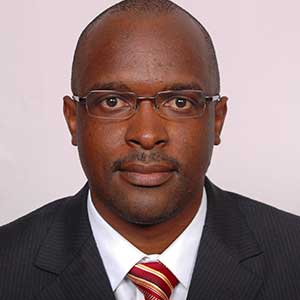
EL BATAN, Mexico (CIMMYT) – Effective partnerships involving research, public and private sector institutions are key to unlocking the potential of smallholder agriculture in sub-Saharan Africa, said Shamie Zingore, a director at the International Plant Nutrition Institute (IPNI), who oversees the region.
Cross-sector partnerships that deliver the results of agricultural research to smallholder farmers, who produce 80 percent of food consumed in the developing world, improve productivity and are essential to providing food security in Africa, said Zingore who will speak at a conference to mark the 50th anniversary of the International Maize and Wheat Improvement Center (CIMMYT) in September.
IPNI is a non-for-profit, science-based organization dedicated to the responsible management of plant nutrition.
Zingore said partnerships that bring together national governments, agricultural research institutes and industry underpin his organizations’ work to support sustainable crop production intensification in the region.
IPNI’s cross-sector efforts to encourage fertilizer use within integrated soil fertility management (ISFM), which involves the use of locally adapted agricultural practices that can maximize the efficiency of nutrient and water use and improve agricultural productivity, shows the power of partnership combined with the development and dissemination of technologies that have increased yields and protected soil fertility, he said. The role of the private sector in addressing challenges that smallholder farmers face in accessing inputs at affordable prices and the knowledge for their appropriate use must be encouraged, he added.
Zingore will participate in a panel discussion during a session titled “Technical Innovations into Context to Achieve Greater Impact” at the CIMMYT 50th anniversary conference which will be held from Sept. 27 to Sept. 29 in Mexico City.
He shared some views on the future of agriculture in the following interview.
Q: What do you hope to contribute to the CIMMYT conference?
The theme of the conference is relevant and timely in the context of the increasingly urgent need to translate agricultural science into practice to support agricultural development and poverty alleviation in the developing world. I’m honored to participate at the conference to share knowledge and insights on the critical role of soil fertility management research in sustainable crop production intensification in sub-Saharan Africa — as well as the processes to achieve impact by adapting agronomic technologies to highly variable and complex conditions on smallholder farms. Effective partnerships between research, public and private sector institutions will be the key to unlock the potential of smallholder agriculture. Representing IPNI, as a fertilizer industry science-based research organization, I also hope to highlight the role of the private sector in addressing the challenges that smallholder farmers face in accessing inputs at affordable prices and the knowledge for their appropriate use.
Q: What is significant about CIMMYT? What role has CIMMYT played in your area of work?
CIMMYT has for many decades conducted innovative and transformational research to improve maize and wheat productivity through the plant breeding, agronomy, farming systems and conservation agriculture and socioeconomic programs. My institution has effectively collaborated with CIMMYT in several initiatives including the CGIAR program on MAIZE and Taking Maize Agronomy to Scale (TAMASA) initiative that have supported wide-scale dissemination of site-specific nutrient management in both conventional and conservation agriculture maize production systems. CIMMYT has played a key role in building effective research and extension partnerships and capacity for delivering agronomic solutions to smallholder farmers in Sub-Saharan Africa.
Q: What are the key challenges the world faces into the future?
The overarching challenge is the question of how agricultural productivity can be increased to meet the food requirements by a rapidly increasing world population that will reach over 7 billion by 2050. Developing countries that are food insecure, including those in sub-Saharan Africa, will contribute most to the increasing population. Technological innovations will need to be increasingly robust to sustainably increase crop productivity and nutrient quality of food produced in the face of land degradation and climate change challenges.
Q: How does your area of specialization address these challenges?
Poor soil fertility, low fertilizer use and inappropriate fertilizer management practices are some of the key factors limiting crop productivity in sub-Saharan Africa. Yields have remained low despite advances made in developing high yielding crop varieties adapted to growing conditions in the region. Strong partnerships on developing ISFM are focusing on the development and dissemination of technologies that contribute not only to increased yields but also pay attention to maintenance of soil organic matter and soil fertility in the long-term. Our research results have shown that appropriate ISFM technologies enhance nutrient and water use efficiency, increasing crop productivity and resilience to moisture stress. We are addressing the issue of balanced nutrient management, with a focus on micronutrient fertilization, to increase productivity in vast agricultural soils that are deficient in micronutrients. Balanced fertilizer, focusing on the applying the right types of fertilizer at the right rate, time and place will be the basis of increasing yield in an economically viable manner and improving the nutrient contents of food produced by smallholder farmers.
TAMASA is a CIMMYT led project funded by the Bill & Melinda Gates Foundation.
 Climate adaptation and mitigation
Climate adaptation and mitigation 
